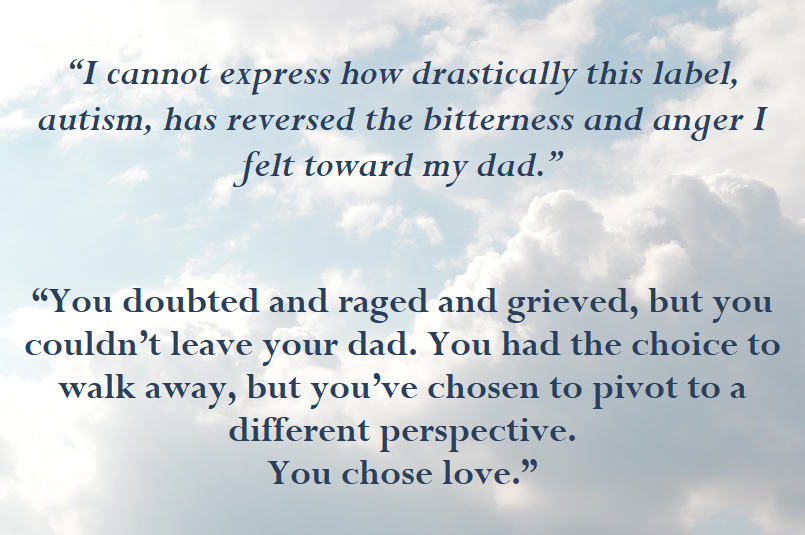
From the archive, 2016. Reprinted by request.
The following letter is one of the most remarkable I’ll ever receive—an adult child discovering that a parent might be on the spectrum and using that possibility as a springboard to previously unimagined empathy, admiration, love and connection. It overflows with the kind of hope I nurture for every autistic individual throughout the entire lifespan. Its message has the power to elevate all of us.
*
Hello Ellen,
I’m a young adult who’s just found out that my dad is on the autism spectrum. Well, “found out” may be too strong. After describing my dad and my relationship with him to a clinician, she suggested he might be on the spectrum. Without jumping to that conclusion, I’ve been trying the idea on for size while I learn more about autism. Now I think it fits pretty well.
In some ways it changes nothing, but it changes everything about how I want to relate to my dad moving forward. Instead of being perpetually disappointed that he doesn’t ask me about my life, my dreams, interests and relationships, I realize that every time he helps me edit a paper, format a resume, organize travel plans, or buys me exactly the birthday gift I asked for, he is reaching out to me. I realize now that I was insensitive every time I tried to take him somewhere new and exciting (to me) or show him something I loved, only to get mad when he didn’t show the same interest or even rejected the place or thing because it was too loud, smelly, confusing or otherwise overwhelming.

I felt disappointed countless times growing up, never understanding why my dad would blow up at me, and why he didn’t understand when I told him that the way he spoke to me hurt my feelings. I didn’t understand why he couldn’t read between the lines when I told him I wasn’t in the mood for something, or that he couldn’t see my pain and give me the support I needed. I cannot imagine the pain he felt when I often brushed off his sadness at not being able to communicate what was wrong. I felt spite because he didn’t know how to ask me what was wrong when I was upset. Now when I think about the times that he did ask, albeit in the wrong way, I realize they were solid attempts to speak my language.
I cannot express how drastically this label, autism, has reversed the bitterness and anger I felt toward my dad. But I don’t want to be irresponsible about applying it, and don’t think I could ever tell him what I “found out.” However, if he is on the spectrum, I think it would help him to know, and to learn why he has a hard time getting along with me, other family members, and pretty much everyone close to him. Just as learning about autism is helping me to adjust my expectations and realize his amazing gifts (like you said in your book about children with autism, my dad does not lie, cheat or judge), I think it would help the rest of my family learn to speak his language. And it would help my dad learn to speak ours even better than he does already. Moreover, I think we would all be amazed not only by his often-overlooked talents, but by the ways my dad has transcended him “limits.” He’s a professional and highly respected by colleagues and clients.
Can you share any advice about adults with autism? I want to be able to be there for my dad in a way I never have before.
Many thanks,
Jessie
Hello Jessie,
One thing I’ve learned in this life is that extraordinary people often aren’t aware that they are. This is true of you. I’ve never received a letter like yours, not even close. You’ve defined both love and autism in a new way. For all your dad didn’t give you, he gave you something invaluable—the opportunity to see, hear and feel life through the senses and sensibilities of someone who experiences it very differently than you do. He opened that door, but you chose to cross the threshold, and you chose to meet what was on the other side without judgment, anger, self-pity or grief. That you found that the label of autism reversed your bitterness and anger is remarkable and stirring and triggered a big ol’ lump in my throat.
Your message both reverses and parallels that of many a parent wrestling with the grief and fear of their child’s autism diagnosis. These are very deep and authentic emotions, often taking years to work through. You experienced those same feelings for many years. You doubted and raged and grieved, but you couldn’t leave your dad. Most parents feel that way about their child, whether the autism diagnosis makes them want to run, or to pull their child closer and shut out a world that doesn’t understand. As a young adult, you now have the choice to walk away, but you’ve chosen to pivot to a different perspective. You chose love.
And you chose not to hang yourself up on a diagnosis, but to focus instead on which characteristics of that diagnosis were relevant to your specific reality, and how you could use them to better relate to your dad. I hope you never lose that focus; never allow yourself to be disturbed or distracted by how others might try to generalize your situation in irrelevant ways.
One caveat: you say, “If he’s on the spectrum, I think it would help him to know.” How do we know that he doesn’t? You’ve pictured yourself in his shoes; do that again now and imagine growing up in the 1960s, when autism was barely a word yet, let alone understood. Your dad undoubtedly sensed, then knew, he was different. What he suffered because of it, we can’t know unless he chooses to tell us. But we do know that the scars of childhood maltreatment run deep and often remain submerged because they’re simply too painful to voice. Your hesitation to tell your parents that you suspect autism is the most mature decision you could make while you’re still discovering and contemplating something that looks to be life-changing for you. Contrary to the cliché, he who hesitates is not always lost. Sometimes he’s looking before leaping. Raising the idea that a loved one may have autism is usually a tough conversation. It’s not entirely about the message; it’s perhaps even more critically about the messenger and the timing. The potential messenger has to ask, what’s my motivation? Am I the person with the best chance of being heard? Might such a message be better received from someone else, whether closer to the problem or with professional distance?
The most important thing we can do for a loved one with autism is to do nothing that would damage a loving relationship. The autism conversation is like a feather pillow broken on the wind; the words released cannot be gathered up and stuffed back in the pillowcase. You may choose to have the autism conversation with your dad and/or your mom at some point. Armed with what you know, along with your healthy curiosity to learn more, I’m confident that you’ll know if and when that time comes. You recognize many positives about your dad, some even quietly heroic, given his challenges. Have you voiced to him your admiration, in specific terms? Focusing on his strengths and gifts may eventually open the door to deeper conversations. It may be that no one has ever done that for him.
I tell you all this because I want you to understand that in letting go of a lifetime of disappointment, in wanting to relate to your dad and appreciate his gifts, in wanting to adopt realistic expectations—you “get” autism to a degree many adults struggle for years to attain.
And finally, I hope you own a mirror and a pencil. I hope you’ll write or otherwise record some of the emotions and experiences of this journey with your dad. You not only have a compelling story, but a captivating voice. Someone once told me this too, long before I began writing about my experiences with autism. She felt my perspective would be cathartic for many people. So is yours.
All the best to both of you for all the years to come,
Ellen

Leave A Comment